Greece › Best Time To Visit
Updated: December 5, 2025 • By Santorini Dave
See Also
• Where to Stay in Athens
• Where to Stay in Santorini
• Where to Stay in Mykonos
• Where to Stay in Naxos
• Where to Stay in Paros
• Where to Stay in Crete
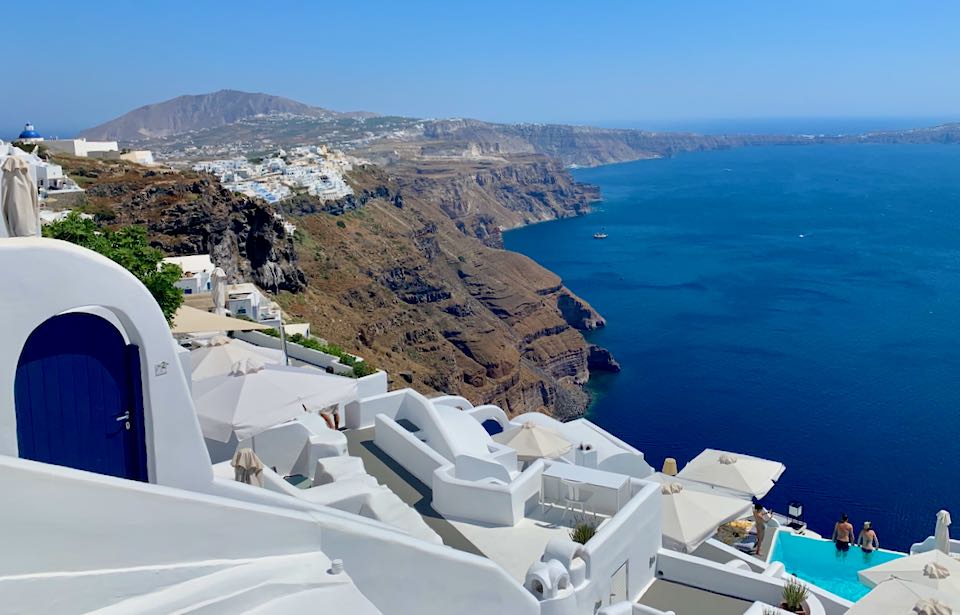
My favorite time to visit Greece is in June and September. During these months, the islands are at their absolute best, with fantastic weather for the beach and exploring the towns. If your trip is more focused on sightseeing and historical attractions, May and October are also excellent.
When’s the Best Time To Visit Greece and the Greek Islands?
The best time to visit Greece is from May to October. This period offers the most sunshine and the least rain. However, the ideal month for your trip depends entirely on your priorities.
- For Swimming & Sunbathing: The best time is late May to early October.
- Note on Sea Temperature: The sea takes time to warm up. In May and early June, the water is brisk (refreshing). By September and October, it has been heated all summer and is like bathwater. If you love warm water, go in September.
- For Nightlife & Parties: Visit in July and August. These are the hottest, busiest, and most expensive months, but the energy is unmatched. This is prime time for Mykonos beach clubs and Ios nightlife.
- For Sightseeing & History: The best months are April, May, June, September, and October. The weather is pleasant (not scorching), and the crowds at major sites are manageable.
- The “Extended Season”: For Athens, Crete, and Santorini, the sightseeing window remains excellent through November and even into winter. These destinations have large local populations and stay vibrant year-round, unlike smaller beach islands that shut down.
My wife and I during a September visit to Santorini.
May and June:
During May and June, Greece experiences spring, with mild to warm temperatures, blooming flowers, and lush landscapes. The weather is typically sunny, with occasional rain showers. I love visiting in May and June for sightseeing, exploring archaeological sites, and outdoor activities like hiking and cycling. The islands and beaches are less crowded than during peak summer months, making it an ideal time for a more relaxed vacation. Accommodation prices are also more moderate.July and August:
July and August (along with late June and early September) are the peak tourist season in Greece, with hot temperatures, sunny days, and large crowds at popular destinations. The islands, beaches, and coastal areas are bustling during this time, and accommodation prices are higher. While I love the summer months for beach and swimming, it can be overwhelming for those interested in sightseeing or looking for a more tranquil experience.September and October:
September and October have warm temperatures, fewer crowds, and more affordable accommodations. The sea remains warm for swimming, and the weather is generally sunny and dry. I recommend this period for exploring the islands, visiting historical sites, and taking in the outdoors.
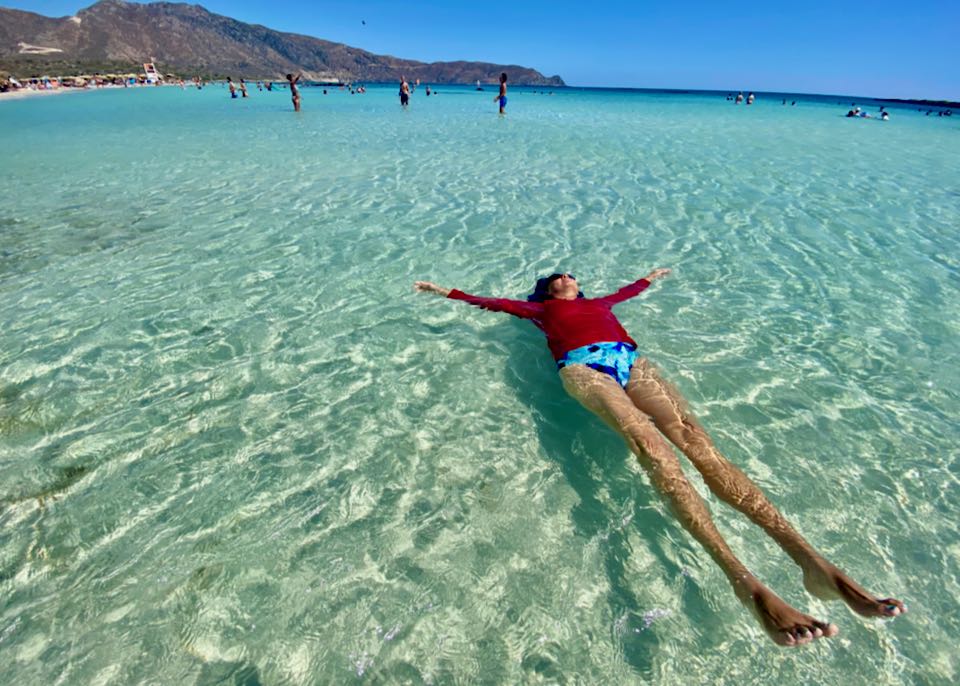
The best time to visit the Greek Islands for beaches, swimming, and water sports is from late May to early October.
When I Like to Visit Greece
- Best Time to Visit Mykonos: June to September
- Best Time to Visit Santorini: Late April, May, June, September, October, early November
- Best Time to Visit Crete: June and September
- Best Time to Visit Rhodes: June and September
- Best Time to Visit Naxos: June to September
- Best Time to Visit Paros: June to September
- Best Time to Visit Ios: July and August
- Best Time to Visit Athens: May, June, September, and October
- Best Time to Visit Corfu: June, July and September
- Best Time to Visit Nafplio & Peloponnese: June and September
Best Months for Greece & the Greek Islands
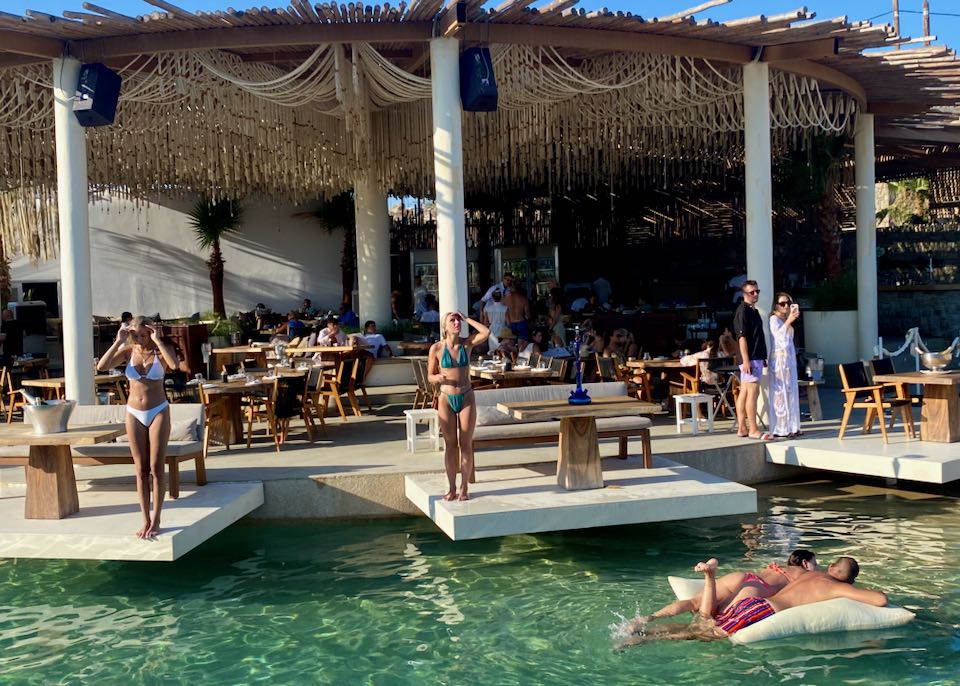
The best beaches and beach clubs in Mykonos are at their best from June to September.
When is the best time to visit the Greek Islands?
The islands are at their absolute peak from late May to early October for swimming, suntanning, and beach life. For sightseeing, hiking, and exploring without the intense heat, April, May, and October are fantastic.
Note on Seasonality: Large islands like Crete, Rhodes, and Santorini stay open year-round (though quieter in winter). Small beach islands (like Antiparos or Koufonisia) effectively shut down from November to March.When is the best time to visit Athens?
Athens is a true year-round destination.
- Spring & Fall: The “Sweet Spot.” Perfect weather for the Acropolis and outdoor dining.
- Summer (July/August): Hot and busy. Packed with tourists, though many locals leave for the islands and mainland villages, so traffic can be surprisingly light. Temperatures often exceed 35°C (95°F). Great for rooftop bars in the evening, but tough for midday walking.
- Winter: Authentic and cozy. Museums are uncrowded, and you experience the real city vibe.
When is the best weather in Greece?
For guaranteed sunshine, go between June and September. However, first-timers often underestimate the sea temperature.
- The Water Temp Surprise: The sea takes time to heat up. In May and June, the weather is hot, but the sea is brisk (refreshing). In September and October, the air is cooler, but the sea retains the summer heat and is like bathwater. If you love warm swimming, choose September.
When is the best time for beaches and swimming?
For the full beach club experience (music, sun, energy), go in June, July, or August. By mid October, many beach bars pack up their sunbeds, even if the weather is still nice.
When is the best time for sightseeing?
April, May, and October are ideal. The air is warm, the light is beautiful for photography, and you won’t get heatstroke climbing the steep path to the Acropolis or Delphi.
Tip: On the first Sunday of the month (Nov-March), entry to archaeological sites is free.My son and one of his friends during a summer visit to the Greek islands.
When is the best time for hiking?
- Spring (April/May): The landscape is lush green and covered in wildflowers. It is stunning, though some high-altitude routes (like mountain peaks in Crete) may still have snow patches.
- Autumn (Sept/Oct): The landscape is drier (golden brown), but the temperatures are stable and perfect for long treks like the Samaria Gorge.
When is the cheapest time to visit Greece?
- Low Season (Nov-March): Cheapest prices (often 50% off), but beach hotels are closed.
- Shoulder Season (April/May & October): Great deals on luxury hotels that would be unaffordable in August.
- The New Reality: June and September are no longer “shoulder season.” Prices remain high until at least mid-October on popular islands like Santorini.
When is the best time for nightlife?
- Peak Party: July and August. This is when the world-famous DJs play Mykonos and the clubs in Ios are packed.
- Good Buzz: Late June and early September. The vibe is lively but less chaotic.
When is the best time for a honeymoon?
- June and September: The gold standard. You get the best weather, full services, and romantic atmosphere without the peak family crowds of August.
- October: Perfect for a “cozy” honeymoon—think red wine on a terrace with a blanket, rather than all-day pool parties.
Is August a good time to visit Greece?
Yes, but you must know what you are signing up for.
- The Pros: The energy is electric. Everything is open. The sea is warm. It is the quintessential summer vacation.
- The Cons: It is crowded, expensive, and hot.
- The “Meltemi” Factor: Strong northern winds blow in August. This keeps the heat down (a lifesaver) but makes the sea choppy. Ferries can be delayed.
- August 15th (The Great Feast): This is a massive national holiday. Ferries will be sold out weeks in advance. Plan accordingly.
When is the best time for Island Hopping?
The best window is late May to late September.
Why? This is when the ferry schedules are running at full capacity. In winter (Nov-March), there are very few ferries connecting the islands directly (e.g., no ferry from Santorini to Mykonos). To island hop effectively without constantly returning to Athens, you need to travel during the tourist season.Can I visit the Greek Islands in winter?
Yes, but be selective.
- Go to: Large islands with local populations like Crete, Rhodes, Corfu, or Syros. They remain vibrant, with open restaurants and museums.
- Avoid: Beach islands like Mykonos, Paros, or Folegandros. They will feel like ghost towns with most hotels and restaurants boarded up.
When is Greek Easter 2026?
Greek Orthodox Easter is April 12, 2026.
Why it matters: It is the biggest holiday of the year. It is a fantastic cultural experience (candlelight processions, fireworks, roasting lamb), but it also means ferries and hotels will be packed with Greeks traveling home. Book your travel well in advance for this week.What are the “Meltemi” winds?
These are strong, dry northern winds that blow through the Aegean, typically from mid-June to September (peaking in July/August).
- The Good: They are nature’s air conditioning. Without them, the 40°C summer heat would be unbearable.
- The Bad: They create choppy seas. High-speed ferries can be delayed or canceled. If you get seasick, book the large, stable Blue Star Ferries during these months.
Greek Travel Guides
- Athens Travel Guide
- Crete Travel Guide
- Mykonos Travel Guide
- Naxos Travel Guide
- Paros Travel Guide
- Santorini Travel Guide
- Greece Travel Guide
Greece Weather by Month
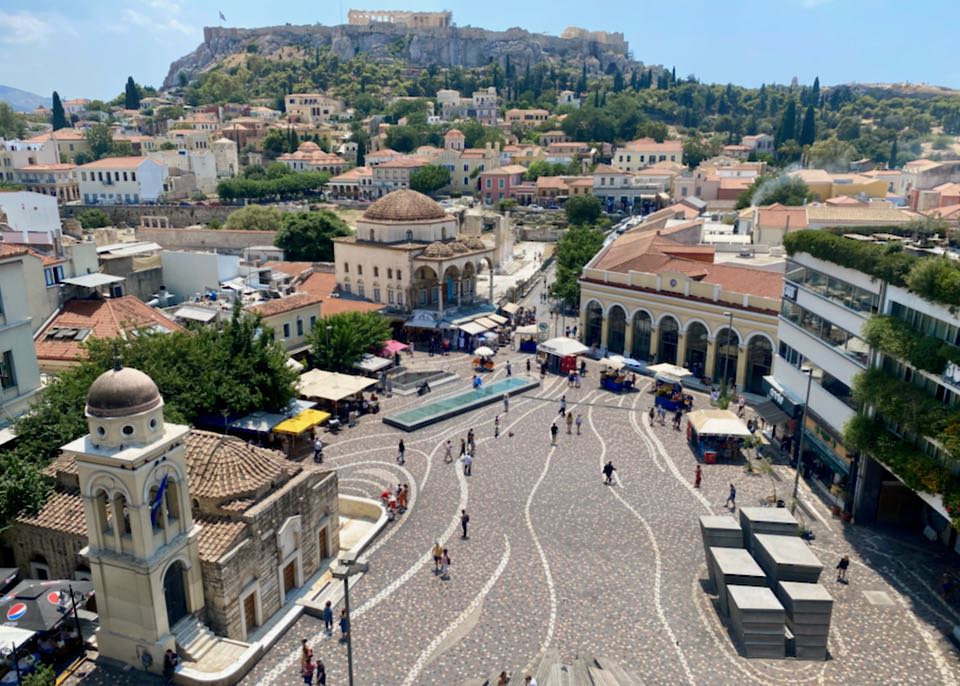
Athens is filled with iconic historical sights that are easily enjoyed anytime of year. (Especially the indoor Acropolis Museum.)
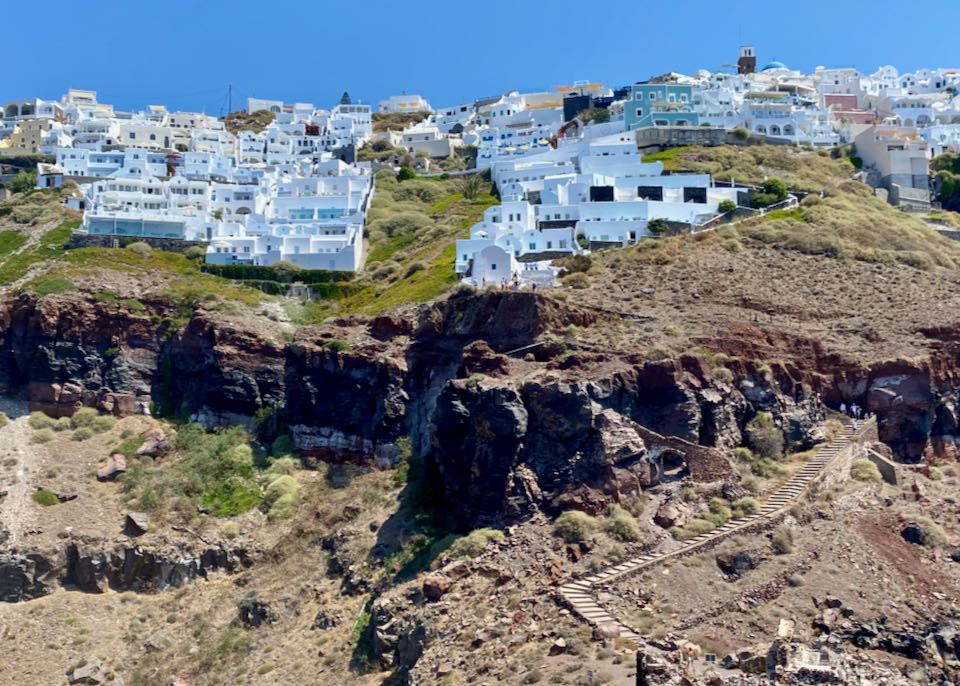
Santorini is loaded with great tours and sightseeing so has a longer tourist season than other Greek islands. If you’re interested in non-beach activities then Santorini is great from April to early November. And if you can tolerate some rain and cloud then Santorini should be considered a year-round destination.
Greece Events and Festivals
Greece in January
- New Year’s Day/Saint Basil’s Day – January 1 is a national holiday, celebrating both New Year’s Day and Saint Basil’s Day in Greece. Saint Basil is the Greek equivalent of Santa Claus, therefore the day is similar to Christmas Day in North America, with gift giving. A special cake is often made with a coin in it as well, known as vasilopita, and whomever gets the piece with the coin is said to have good luck. The day in general is considered a lucky time, and there are often card games that go on for hours, mostly at home, but also in coffee shops and clubs.
- Ephiphany – Epiphany is celebrated on January 6th in many places throughout Europe, including Greece, a time when the Blessing of the Waters takes place. A cross is tossed into a lake, river or the sea, and retrieved by swimmers who get good luck in return. There is usually a ceremony, and it’s particularly elaborate in the port of Piraeus.
- Patras Carnival – The Patras Carnival is the biggest festival of the year in Greece, and one of the largest in Europe too. Purely of Italian origin, it includes elaborate festivities with parades, street music, dancing, balls, treasure hunts, and more. It begins in mid-January and runs through mid-February every year.
Greece in February
- Carnival – In addition to the Patras Carnival, other Carnivals are hosted through Greece, mostly in February, typically three weeks before the beginning of Lent. Some of the best festivities can be enjoyed in Athens, Skyros, Chios, Lamia, Crete, Heraklio, Zante, and Naousa. Except to find lots of drinking and feasting, costumes, parades, dancing, marching bands, and more.
- Clean Monday – One of the most important feasts throughout Greece, Clean Monday takes places on the first day of the seventh week before Easter Sunday, also marking the end of the Carnival celebrations. A public holiday, it includes outdoor excursions, consuming shellfish, and often building and flying kites.
Greece in March
- Independence Day and the Feast of the Annunciation – These two holidays are celebrated simultaneously on March 25. The streets fill with all sorts of festivities and parades. Due to the holiday, some sites may be closed and streets are sometimes blocked as well.
Greece in April
- Holy Week and Easter – Holy Week is celebrated from Palm Sunday to Easter Sunday, sometimes falling in late March, but most often it’s in April. In 2022, April 24 is Easter Sunday, and Holy Week is April 17 through April 23. For Greeks, Easter is the biggest religious holiday of the year. During Holy Week, many shops have special hours and there are church services every evening. Just before midnight on Saturday, many Greeks gather at church with Easter candles, and just before midnight the lights are switched off, representing Jesus’ death, just before the priest announces that “Christ Has Risen.” That’s followed by kisses, cheering and fireworks. On Easter, friends and family gather for a big feast.
- Athens International Film and Video Festival – This festival in Athens brings some 250 films and video and includes experimental, narrative, short-form, feature length, and documentary films from around the world.
- The Feast of Saint George – The Feast of Saint George (Agios Georgios Day) is an important rural celebration on April 23rd each year that includes feasting and dancing, with the festivities taking place where Saint George, the patron of the shepherds, is considered the patron saint. Some of the best are held in Skyros, Skiathos, and Arachova.
Greece in May
- May Day/International Workers’ Day – May 1 is May Day and International Workers’ Day in Greece. Major strikes and/or protests as well as parades may be scheduled on this day, popularized by the Soviet Union as a holiday for workers. For May Day, flower festivals are common as it falls during the peak of flower season. Most monuments, museums, attractions, and some shops will be closed, though most restaurants will be open.
- Salsa Spring Festival – One of Europe’s top dance events, the Salsa Spring Festival features some of the best dance instructors and performers from around the world along with top local artists in late May in Loutraki, Korinthia.
- Athens Jazz Festival, Athens, Greece – The city of Athens hosts the annual Athens Jazz Festival, considered one of the best festivals of its kind in Europe. It takes place over five days in late May and showcases European as well as international artists; entrance is free.
Greece in June
- Athens and Epidaurus Festival – The biggest summer festival of the year, this festival showcases dance, theater, music and opera at the Odeon of Herodes Atticus beneath the Acropolis, as well as music and drama at the Theater of Epidaurus. It runs from mid-June through early September.
- European Music Day – European Music Day is a national event celebrated in some 50 cities across Greece for five days starting on summer solstice, June 21st. It includes 350 events that are hosted at over 200 venues, including parks, gardens, squares and archaeological sites, by music ensembles, philharmonic and symphony orchestras, choirs, and dance groups.
- Miaoulia Festival, Hydra – This festival on Hydra commemorates the life of Admiral Miaoulis who played a key role in the Greek War of Independence. It features parades, art shows, circus acts, dance performances, and more.
- Navy Week – Navy Week honors the country’s long relationship with the sea in late June. Ports and fishing villages throughout Greece host parties and historical re-enactments. Crete offers a big celebration with sailing, swimming, music and dancing.
Greece in July
- Puppet Festival, Hydra – This annual puppet festival is hosted in Hydra in early July and draws puppeteers from around the world.
- Sani Festival, Kassandra, Halkidiki – This festival based at Sani Resort begins in mid-July and runs through mid-August. It features film screenings, classical music concerts, and avant-garde theater acts.
- Philippi Festival, Kavala – This event is hosted at the ancient theater of Philippi in Kavala, a northern Greece city, starting in mid-July and running through late August. It showcases music and theater presented by talented young artists.
- Hippocratia Festival, Kos – Hippocratia is actually a number of cultural events that take place to honor the traditions and customs of the island of Kos starting in July and running through October. There are classical and traditional music concerts, theatrical performances, art exhibitions, and more.
Greece in August
- International Music Festival of Aegina – This annual event features music complemented by the sounds of the waves on Avra Beach, and other spots around the island of Aegina throughout most of the month of August.
- Olympus Festival, Mount Olympus – The Olympus Festival includes plays that are performed at the restored ancient theater throughout August.
- Chania Rock Festival – This festival, hosted in the old city of Chania on the island of Crete during the first half of August, showcases a variety of Greek and international performers, up-and-coming artists, and rock bands.
- Houdetsi Music Festival – Held annually for four days in August in the village of Houdetsi on Crete, this festival features a mix of music from across the globe.
- Feast of the Assumption of the Virgin – August 15th is an important day of religious pilgrimage, a feast that celebrates Mary’s ascent to heaven. As many Greeks return home to visit, travelers may have a difficult time finding a room. It’s especially elaborate in Tinos, when thousands arrive to participate in the all-night vigil at the cathedral of Panagia Evangelistria.
Greece in September
- International Music Festival, Santorini – The International Music Festival of Santorini is held over the first three weeks of September in the heart of Fira village. It features top artists from around the world, including classical and tango music, solo recitals, orchestras, operatic music, and piano duets.
- Pistachio Festival, Aegina – Hosted annually over four days in mid-September, the Pistachio Festival features all things pistachio, with a variety of pistachio products for sale as well as concerts, plays, exhibitions, and gastronomy nights.
- Festival of Tastes and Traditions, Rhodes – Taking place annually over two days in mid-September in the village of Pefkos, this festival includes wine tasting, live cooking demonstrations, exhibitions of traditional products, traditional music and dancing, a parade, and more.
Greece in October
- Chestnut Festival Elos, Crete – The Chestnut Festival is celebrated annually, typically over the last weekend of October in the village of Elos. It includes roasted chestnuts and other foods, traditional folk music, dancing, and drinking.
- Dimitria Festival, Thessaloniki – Held on October 26th each year, this festival showcases music, ballet, and opera.
- Oxi Day – This is a feast day party and a national holiday that includes military parades, folk dancing, folk music and parades on October 28th each year to celebrate the nation’s refusal to yield to the powers of the Axis in 1940.
Greece in November
- Feast of the Archangels Gabriel and Michael – Churches throughout Greece named for these archangels will host ceremonies on November 8th.
- Anniversary of the Polytechnic Uprising, Athens – This November 17th holiday commemorates the anniversary of the student uprising in 1973 at Polytechnic University in Athens, which killed many students when tanks crashed into the university gates. There is a march and stoning of the American Embassy, making it best to avoid that area on that day.
- Saint Andreas Name Day, Patras – As Saint Andreas is the patron saint of Patras, this city hosts a big celebration honoring the saint annually on November 25th. It begins the evening before with mass which continues into the morning, followed by a parade.
Greece in December
- Feast of St. Nikolaos/St. Nicholas – This annual December 6th feast honors the patron saint of sailors through multiple processions which head to the sea, and to chapels that are dedicated to him.
- Kladaries, Kozani – Annually on December 23, the Kladaries commemorates the shepherds who lit bonfires to announced the birth of Christ. In the village of Siatista, residents gather together to light fires and dance around them while enjoying the local wines.
- Christmas Day – December 25th is a public holiday, and although it’s not considered as important as Easter in the Greek Orthodox religion, it’s celebrated with feasts and religious services, as well as gift giving, Christmas caroling, trees, and decorations.
- New Year’s Eve – December 31st, New Year’s Eve, in Greece is traditionally celebrated by children singing carols outside while elders talk, play cards, eat, drink, and smoke. Today, most people celebrate the way the night is celebrated throughout the world, going to bars, attending parties, and watching fireworks displays that are hosted in the central squares of many cities throughout Greece.

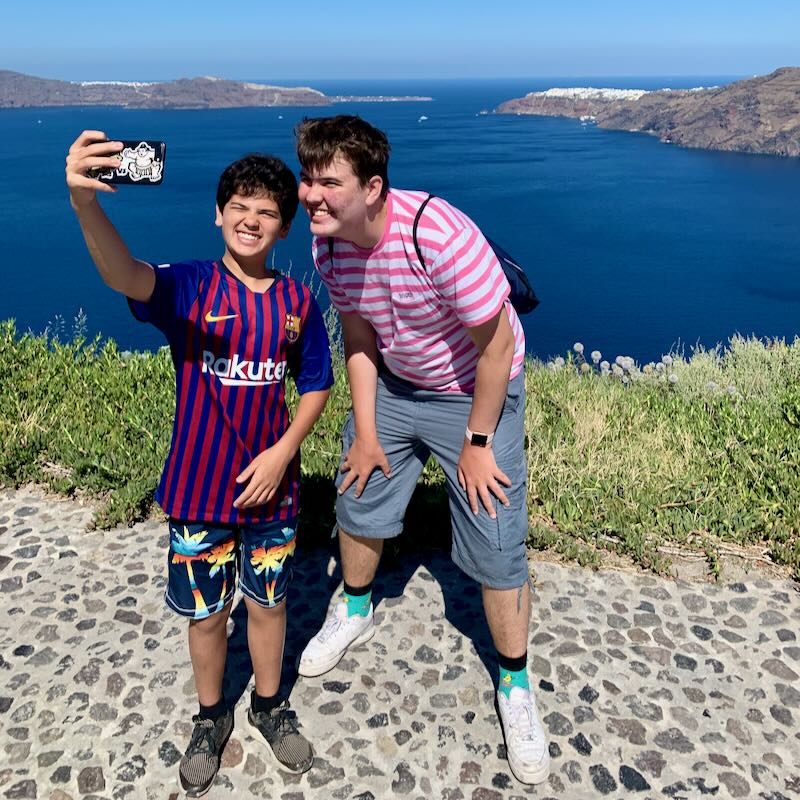
About Santorini Dave